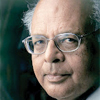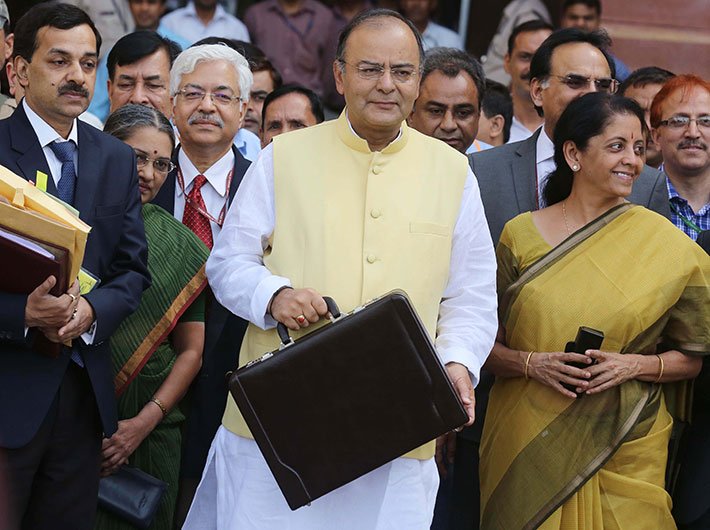There are three things not worth running for – a bus, a woman or a new economic panacea. If you wait a bit, another one will come along,” said the first Viscount Amory, British chancellor of the exchequer, in the 1960s. It is too much to expect such wit from an Indian finance minister; all they can think of is quotations from obscure Hindi poetry. Nevertheless, it must be conceded that Arun Jaitley presented a better budget last week. Admittedly, his first budget last July was not too difficult to improve upon; it was merely a long list of big gifts to party hangers-on. But still, he got beyond hand-me-downs and down to the real business of budget-making, which is threefold: seeking parliament’s approval for his intentions of taxation, expenditure and borrowing, managing the macroeconomy, and giving incentives and disincentives to steer economic activity.
He raised personal income tax, which will raise the tax at higher income levels; the top rate will go up from 34 to 34.6 per cent. There is no point to such small changes, except that they are unlikely to get taxpayers worked up. More important, he has promised to reduce corporate income tax from 30 to 25 per cent over five years. He increased general sales tax marginally from 12.36 to 12.5 per cent, but raised it massively on services from 12.36 to 16 per cent; calling 2 per cent of it Swachchh Bharat Cess does not make it any more palatable. What is striking, however, is what he did not do. Manufacturing industry is in a deep trough; industrial output has been falling for some time. It needs to be rescued. It would have been so easy to do something for it: Jaitley could have reduced taxes, or given investment incentives. He did give generous funding to the schemes of his able colleague, the railways minister, but otherwise he ignored the plaints of industrialists.
Jaitley had considerable elbow room. The fiscal deficit of 4.1 per cent was not high by Indian standards; our public debt is modest in relation to our gross domestic product, which is itself rising at a respectable rate, and inflation has come down. If the government stopped raising procurement prices, inflation would fall even faster. So Jaitley could afford to raise the fiscal deficit. As his chief economic advisor said the previous day, the Indian economy is in a “sweet spot”: if the government is serious about making India a manufacturing superpower, it should be spending much more on infrastructure. Jaitley missed the chance to do so; his modest mien does not go with the colourful prime minister’s tall ambitions.
Public distribution system and national rural employment guarantee were the previous government’s hallmark populist schemes: for its admirers, they subsidised the poor, while its critics like me believed that they were the world’s biggest corruption engenderment schemes. Jaitley did not have the courage to scrap them, but he raised allocations to each of them by a modest 2-3 per cent.
This government abolished the planning commission. That is easy: just change the name on the building, and get rid of the worthies the previous government had installed as members. But planning cannot be got rid of so easily: every government has to look into the future. Jaitley has increased enormously transfers to the states; it would seem that this government also intends to pass on the planning function to them. That is an error on four grounds. First, there are things that have to be planned on the national scale, for instance, defence, transport, energy, water supply and education. Second, states tend to take a short-term view. They are run by shortsighted politicians, who find nothing easier than to spend public money on self-enrichment and re-election.
Third, India needs to trade more and have closer ties with other countries, especially its neighbours in the Indian Ocean; states have no interest in doing so. And finally, the states have made a terrible mess of power generation. Only the centre can hammer some sense into them; and it can do so only if it uses its capacity to invest. Generally, governments come and go, and with them go their errors. But Jaitley’s error of “decentralising” planning is likely to do lasting damage to our country.
I am no politician; my comments are based on economics. That raises a question in my mind: did not Jaitley’s chief economic advisor, Arvind Subramaniam, tell him things? Arvind is a good economist. I have heard and read him before the budget; I have seen his Economic Survey. He is so ambitious; he has some great ideas. How is it that they are so far away from this budget? My inference is that he was excluded from the team that made the budget. This would be unusual; I, for example, was an integral member of the budget-making team when I was in the finance ministry. If Arvind was not, that was a terrible mistake of Jaitley. He is doing as badly as finance minister as I expected.
(The article appears in the March 16-31, 2015, issue)

